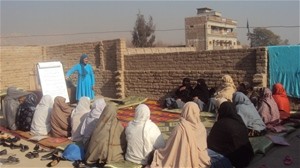
A group of women elders from Qasam Abad village, Behsud District, meet to discuss women's role in dispute resolution and to form their own "Spinsary Group."
RLS-I Checchi Consulting
4 APRIL 2011 | NANGARHAR PROVINCE, AFGHANISTAN
Women living in villages of Nangarhar Province have had limited access to justice systems, and minimal, if any, involvement in public decision-making processes. However, this is beginning to change as a result of a range of elders networks that encourage male and female elders to discuss and improve local systems for alternative dispute resolution. As an outcome of the elders network meetings, four women's dispute resolution groups, known locally as Spinsary groups, have been established in Surkh Rod and Behsud districts. USAID-funded justice advisers and respected male elders have trained the groups in a range of dispute resolution techniques, traditional justice, and tribal customs.
“Nineteen years ago, I was given away by my family to another family as baad (a form of condolence payment) to resolve a murder conflict. I was very young. When I came of age, I was beaten and treated like I was not human," said a Sawati village woman. "The Spinsary made a good mediation, and now I am happy, living in a good situation with this family, and the Spinsary keeps watch."
The four Spinsary groups have already resolved eight major disputes and more than 50 minor disputes that were having a destabilizing effect on their villages. The men have been very supportive of the groups and report positive benefits to their community because of the mediation work of these women.
“The group of Spinsary women brought peace to my home and community. If Spinsary didn’t attend and resolve my dispute in my village, I would be in prison or killed by now," said Mr Aajab Gul, from Nangarhar Province, who sought help from a women's dispute resolution group in a violent dispute.
The Spinsary women also attend USAID-funded rule of law workshops to strengthen their skills in dispute resolution in step with the laws of Afghanistan. The groups meet regularly to discuss dispute resolution cases and how to increase access to justice for women and children.
USAID’s Rule of Law Stabilization Program - Informal Component fosters linkages between the formal and informal justice systems, increases access to justice, and increases stability through the resolution of conflicts.







Comment
Make a general inquiry or suggest an improvement.